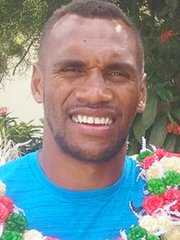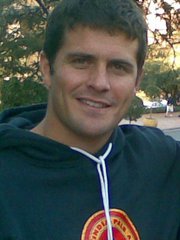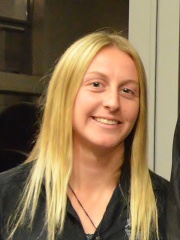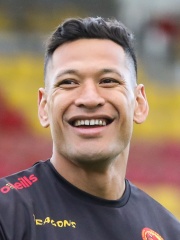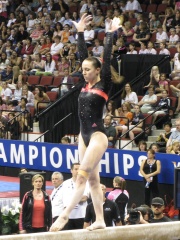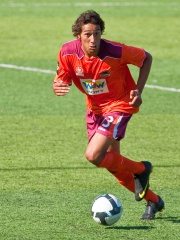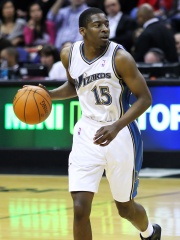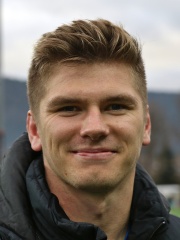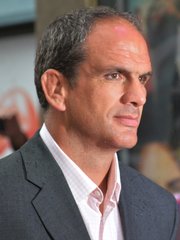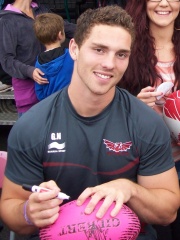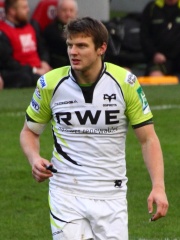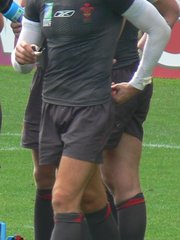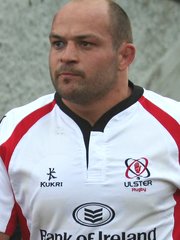RUGBY PLAYER
Leigh Halfpenny
1988 - Today

 Leigh Halfpenny
Leigh Halfpenny
Stephen Leigh Halfpenny (born 22 December 1988) is a Welsh rugby union professional rugby union player who plays fullback or wing for Cardiff in the United Rugby Championship. Halfpenny is the third highest points scorer for Wales after Neil Jenkins and Stephen Jones. Read more on Wikipedia
His biography is available in 14 different languages on Wikipedia. Leigh Halfpenny is the 57th most popular rugby player, the 8,789th most popular biography from United Kingdom and the 10th most popular British Rugby Player.
Leigh Halfpenny is most famous for his exceptional goal-kicking ability and his performances as a fullback for the Wales national rugby team and the British Lions. He played a key role in Wales' success in the Six Nations Championship and was instrumental in their 2011 Rugby World Cup campaign.
Memorability Metrics
Page views of Leigh Halfpenny by language
Among RUGBY PLAYERS
Among rugby players, Leigh Halfpenny ranks 57 out of 35. Before him are Kenki Fukuoka, Jacques Burger, Osea Kolinisau, Alun Wyn Jones, Duane Vermeulen, and Handré Pollard. After him are Morné Steyn, Kelly Brazier, Kurt-Lee Arendse, Theresa Fitzpatrick, Gastón Revol, and Israel Folau.
Most Popular Rugby Players in Wikipedia
Go to all RankingsKenki Fukuoka
1992 - Present
HPI: 32.64
Rank: 51
Jacques Burger
1983 - Present
HPI: 32.27
Rank: 52
Osea Kolinisau
1985 - Present
HPI: 31.89
Rank: 53
Alun Wyn Jones
1985 - Present
HPI: 31.83
Rank: 54
Duane Vermeulen
1986 - Present
HPI: 31.77
Rank: 55
Handré Pollard
1994 - Present
HPI: 31.46
Rank: 56
Leigh Halfpenny
1988 - Present
HPI: 31.38
Rank: 57
Morné Steyn
1984 - Present
HPI: 31.17
Rank: 58
Kelly Brazier
1989 - Present
HPI: 31.08
Rank: 59
Kurt-Lee Arendse
1996 - Present
HPI: 30.72
Rank: 60
Theresa Fitzpatrick
1995 - Present
HPI: 30.32
Rank: 61
Gastón Revol
1986 - Present
HPI: 30.02
Rank: 62
Israel Folau
1989 - Present
HPI: 29.87
Rank: 63
Contemporaries
Among people born in 1988, Leigh Halfpenny ranks 1,870. Before him are Eydison, Trine Schmidt, Shogo Iike, McKey Sullivan, Asher Monroe, and Chellsie Memmel. After him are Scott Sunderland, Adam Sarota, Jordan Crawford, Yuto Shirai, Aida El-Kashef, and Dorjnyambuugiin Otgondalai.
Others Born in 1988
Go to all RankingsEydison
SOCCER PLAYER
1988 - Present
HPI: 31.52
Rank: 1,864
Trine Schmidt
CYCLIST
1988 - Present
HPI: 31.51
Rank: 1,865
Shogo Iike
SOCCER PLAYER
1988 - Present
HPI: 31.50
Rank: 1,866
McKey Sullivan
MODEL
1988 - Present
HPI: 31.48
Rank: 1,867
Asher Monroe
MUSICIAN
1988 - Present
HPI: 31.47
Rank: 1,868
Chellsie Memmel
GYMNAST
1988 - Present
HPI: 31.47
Rank: 1,869
Leigh Halfpenny
RUGBY PLAYER
1988 - Present
HPI: 31.38
Rank: 1,870
Scott Sunderland
CYCLIST
1988 - Present
HPI: 31.36
Rank: 1,871
Adam Sarota
SOCCER PLAYER
1988 - Present
HPI: 31.32
Rank: 1,872
Jordan Crawford
BASKETBALL PLAYER
1988 - Present
HPI: 31.31
Rank: 1,873
Yuto Shirai
SOCCER PLAYER
1988 - Present
HPI: 31.31
Rank: 1,874
Aida El-Kashef
FILM DIRECTOR
1988 - Present
HPI: 31.31
Rank: 1,875
Dorjnyambuugiin Otgondalai
BOXER
1988 - Present
HPI: 31.28
Rank: 1,876
Among RUGBY PLAYERS In United Kingdom
Among rugby players born in United Kingdom, Leigh Halfpenny ranks 10. Before him are Gareth Thomas (1974), Owen Farrell (1991), Martin Johnson (1970), George North (1992), Dan Biggar (1989), and Alun Wyn Jones (1985). After him are Stuart Hogg (1992), Shannon Izar (1993), James Hook (1985), Rory Best (1982), Ben Youngs (1989), and Jonathan Davies (1988).
Gareth Thomas
1974 - Present
HPI: 36.17
Rank: 4
Owen Farrell
1991 - Present
HPI: 36.00
Rank: 5
Martin Johnson
1970 - Present
HPI: 34.88
Rank: 6
George North
1992 - Present
HPI: 34.84
Rank: 7
Dan Biggar
1989 - Present
HPI: 34.53
Rank: 8
Alun Wyn Jones
1985 - Present
HPI: 31.83
Rank: 9
Leigh Halfpenny
1988 - Present
HPI: 31.38
Rank: 10
Stuart Hogg
1992 - Present
HPI: 29.51
Rank: 11
Shannon Izar
1993 - Present
HPI: 29.40
Rank: 12
James Hook
1985 - Present
HPI: 28.75
Rank: 13
Rory Best
1982 - Present
HPI: 28.50
Rank: 14
Ben Youngs
1989 - Present
HPI: 27.05
Rank: 15
Jonathan Davies
1988 - Present
HPI: 26.19
Rank: 16


